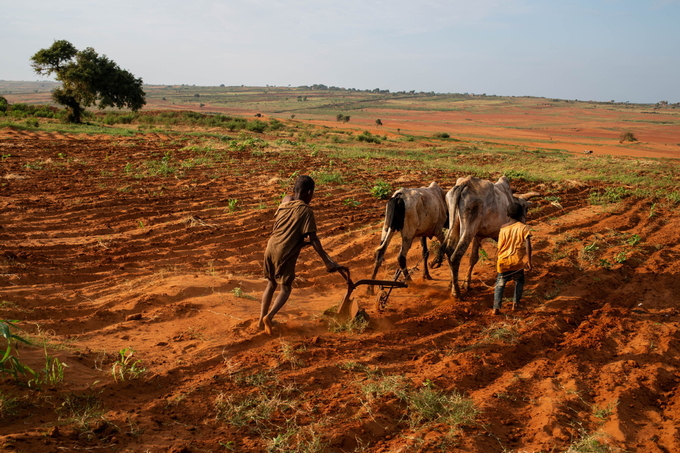June 18, 2025 | 02:19 GMT +7
June 18, 2025 | 02:19 GMT +7
Hotline: 0913.378.918
June 18, 2025 | 02:19 GMT +7
Hotline: 0913.378.918

Children attempt to plough a plantation using cattle in Grand Sud of Betsimeda, Maroalomainty commune, Ambovombe District, Madagascar, on May 2, 2021. Photo: Agencies
This unity of purpose through the summit, held in Nairobi from Sept 4 to 6, culminated with the unveiling of "The African Leaders Nairobi Declaration on Climate Change", which will galvanize Africa to speak with one voice on matters of greening the continent's industrial development and decarbonizing the global economy.
As the least emitter of greenhouse gases, the continent of Africa has been hard hit by the consequences of climate change in recent decades at an unprecedented scale, due to poor climate adaptation and mitigation financing. Undeniably, the impacts of climate change have been described as the greatest existential threat not only to Africa but to the whole of humanity. This is shown in the Global Climate Report 2022 released by the World Meteorological Organization.
The report said that more than 110 million people across Africa suffered the direct effects of climate change last year. This resulted in about 5,000 deaths, largely through drought and flooding.
Regarding the economy, cases related to climate change caused damage of more than $8.5 billion. Food security has also been affected, with the growth of the continent's agricultural productivity having declined by 34 percent since 1961 due to climate change. The statistics continue to increase each day as leaders, policymakers and other stakeholders in both the Global North and Global South continue with accusations about who is the greatest emitter of greenhouse gases. Thus, the essence of the communique from the Africa Climate Summit is that we all need to shift our climate change policies from commitments to actions.
Furthermore, borrowing from President Xi Jinping's quest for a just ecological civilization that is more action-oriented, the Africa Climate Summit also focused on delivering climate-positive growth and finance solutions for Africa and the world.
Thus, to reconcile the African Union's Agenda 2063 with green industrialization, the continent needs to embrace several strategies.
First, moving from commitment to action is needed. Africa must unlock its rich natural resources to develop renewable energy. As observed during the climate summit, Africa is the continent with 60 percent of the world's renewable energy assets, including solar, geothermal, wind and hydropower. In addition, the continent's infrastructure for capturing and storing atmospheric carbon dioxide is the largest in the world. By contrast, Africa's fossil fuels account for 91.5 percent of energy consumption. Thus, to reverse the negative impacts of fossil fuels in Africa, the continent must increase its renewable energy capacity from the current 56 gigawatts to at least 300 GW by 2030.
Second, sustainable green financing must be secured. Africa still faces the challenge of securing the scale of financing needed to unlock its green growth. For instance, according to the "State of the Climate in Africa Report 2022" by the World Meteorological Organization, the continent needs about $2.8 trillion between 2020 and 2030 to finance African countries' nationally determined contributions.
Thus, the Africa Climate Summit called upon the world's biggest emitters of greenhouse gases and richest countries to keep their promises — noting, in particular, an unfulfilled pledge of $100 billion in annual climate financing to developing nations, made years ago. The unfulfilled promises have been the biggest impediment to the fight against climate change and the development of sustainable renewable energy. Yet developed countries have been pushing developing countries to industrialize without the use of fossil energy.
Third, the power of partnerships must be embraced. The level of green development taking place on the continent through the power of partnership is unparalleled. The African Development Bank, the largest crusader for partnership, is committed to providing $25 billion for climate financing by 2025. Additionally, in transforming the continent into the world's green hub, the African Development Bank is implementing a $20 billion initiative, Desert to Power, to harness solar power and deliver electricity to 250 million people. This will help power the continent for green industrial growth and development.
Last but not least, the rising pan-African era needs to be utilized. The African Union has become a permanent member of the G20, and with the increase of African voices in the global multilateral system, the continent must develop its own carbon markets, price its carbon accurately, and harvest its vast mineral wealth to accelerate its green growth. Thus, tapping into Africa's rich natural resources will be the sharpest weapon for decarbonizing the continent and transforming it into the world's green hub.
(CND)

(VAN) Extensive licensing requirements raise concerns about intellectual property theft.

(VAN) As of Friday, a salmonella outbreak linked to a California egg producer had sickened at least 79 people. Of the infected people, 21 hospitalizations were reported, U.S. health officials said.

(VAN) With the war ongoing, many Ukrainian farmers and rural farming families face limited access to their land due to mines and lack the financial resources to purchase needed agricultural inputs.

(VAN) Vikas Rambal has quietly built a $5 billion business empire in manufacturing, property and solar, and catapulted onto the Rich List.

(VAN) Available cropland now at less than five percent, according to latest geospatial assessment from FAO and UNOSAT.

(VAN) Alt Carbon has raised $12 million in a seed round as it plans to scale its carbon dioxide removal work in the South Asian nation.

(VAN) Attempts to bring down the price of the Japanese staple have had little effect amid a cost-of-living crisis.